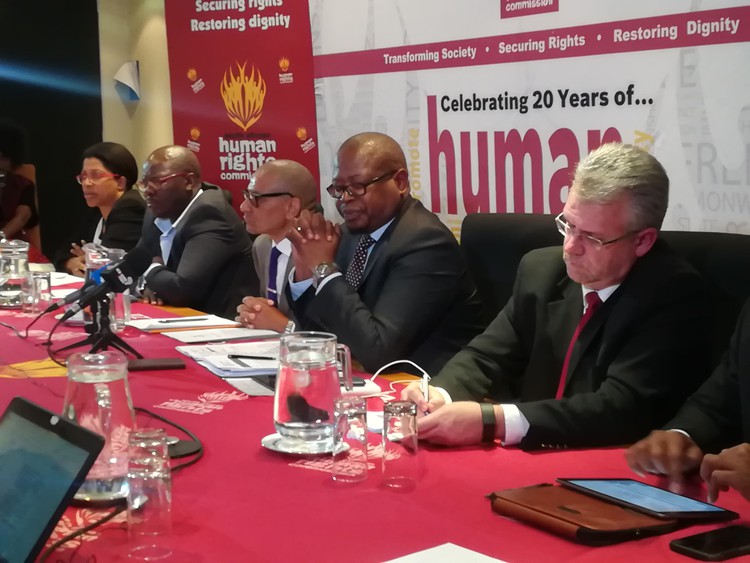Home Affairs asks UN for help with refugee backlog
Department has to process 150,000 appeals
The Department of Home Affairs has approached the United Nations High Commission on Refugees (UNHCR) to help it clear the 150,000 backlog of refugee status appeals, according to Director of Asylum Seekers, Mandla Madumisa.
Madumisa was speaking at the South African Human Rights Commission (SAHRC) on Thursday. The SAHRC subpoenaed Acting Director General of Home Affairs, Thulani Mavuso, to address complaints that the department takes a long time to process asylum applications and permanent residence permits.
Chairperson of the SAHRC, Bongani Majola, said his institution had struggled to engage with Home Affairs for the past year so a subpoena was necessary.
Majola said: “Home Affairs is a central structure that affects so many people’s lives.” A working relationship should be established between the commission and Home Affairs so that individual cases could be dealt with efficiently, he said.
Majola asked Home Affairs representatives whether any progress had been made on the backlog of refugee appeals.
Madumisa said a consultant from UNHCR was appointed and started in May 2019. The consultant would assess the situation at Home Affairs and would come up with a comprehensive plan to deal with the backlog. “By the end of July the Department will receive that report and we will have a clear way forward on how we will deal with the backlog,” he said.
Mavuso said that Home Affairs also struggled with verification of information when it came to spousal visa applications. He said the turnaround time for the department is currently eight months but he said it was looking into extending it to 18 months.
“Eight months becomes a challenge because an adjudicator cannot touch an application before the inspector can put a stamp on the verification of information including supporting documents,” he said.
He said this meant that the inspectors would need to do various interviews and confirm that the information presented to Home Affairs is verified.
“You have cases where people submit police clearance documents but the documents have been totally manipulated… so because of the constraints on the ground of the inspectors, we will have to ensure that the [turn around] period increases,” he told the panel.
Mavuso said the turnaround time depended on whether the information provided was easily verified.
But Commissioner Angie Makwetla asked Mavuso whether Home Affairs kept the applicants informed on the status of their application “because a person can’t wait from 2016 to 2018 and not know what is happening”.
Jackie McKay, Deputy Director General of Immigration, responded: “We would love to do that. In fact any good department would do that. But I have 22 people who deal with all of these cases … I’m working my staff to the bone.”
He said Home Affairs did not have systems in place that could automate those updates but he said it was currently working on a system that would make it more efficient.
CORRECTION: We identified the wrong UN agency in the original version of this article. This has been corrected.
Support independent journalism
Donate using Payfast

Don't miss out on the latest news
We respect your privacy, and promise we won't spam you.
Letters
Dear Editor
I was arrested by home affairs on 7 May, when I visited the office [in Pretoria] for an extension. My temporary asylum permit turned 10 years on 5 May 2019. I was handcuffed and taken to Pretoria Central Police Station where no fingerprints were taken, no docket opened. My paper was still valid until midnight and would only expire that morning.
The Home Affairs official gave me a lawyer. I stayed police cells for seven days and was released on a R4,000 bail. Now I don't have any papers because it was confiscated.
Dear Editor
XAVERI SA and the Refugee Alliance for Justice view the call by the Department of Home Affairs (DHA) for the United Nations High Commission for Refugees (UNHCR) to help it deal with the refugee backlog it has been battling to address since 2005 as a window-dressing and cheap facing-saving exercise aimed at making itself relevant to the management of the country’s refugee system when reality proves otherwise.
We also view it as a fundraising campaign that has its eyes focused on the wallets of the international community. It is also a desperate effort to avoid the pending multitudes of litigations for compensation by refugees whose lives have been destroyed by its chaotic refugee management system by being kept as asylum seekers for years and being denied the most basic civil right. And those with refugee statuses without full rights for integration.
It is indeed interesting to note that it is actually the Department of Home Affairs which has deliberately been creating the backlogs as it has been mixing refugees and migrants by regarding them both as asylum seekers. Then going on to seek to benefit from the situation by turning the asylum papers into some sort of visa which could be renewed at a cost.
It then made the situation worse by reducing the duration of the refugee status to that of an asylum seeker's of about six months, adding more to its workload.
What has been very worrying to us about is the Department's arrogance which seems to be based on the belief that it is above the law and can get away with any nonsense. This is clearly seen in its lack of respect for the judiciary with numerous acts of contempt of court.
© 2019 GroundUp.
This article is licensed under a Creative Commons Attribution-NoDerivatives 4.0 International License.
You may republish this article, so long as you credit the authors and GroundUp, and do not change the text. Please include a link back to the original article.

